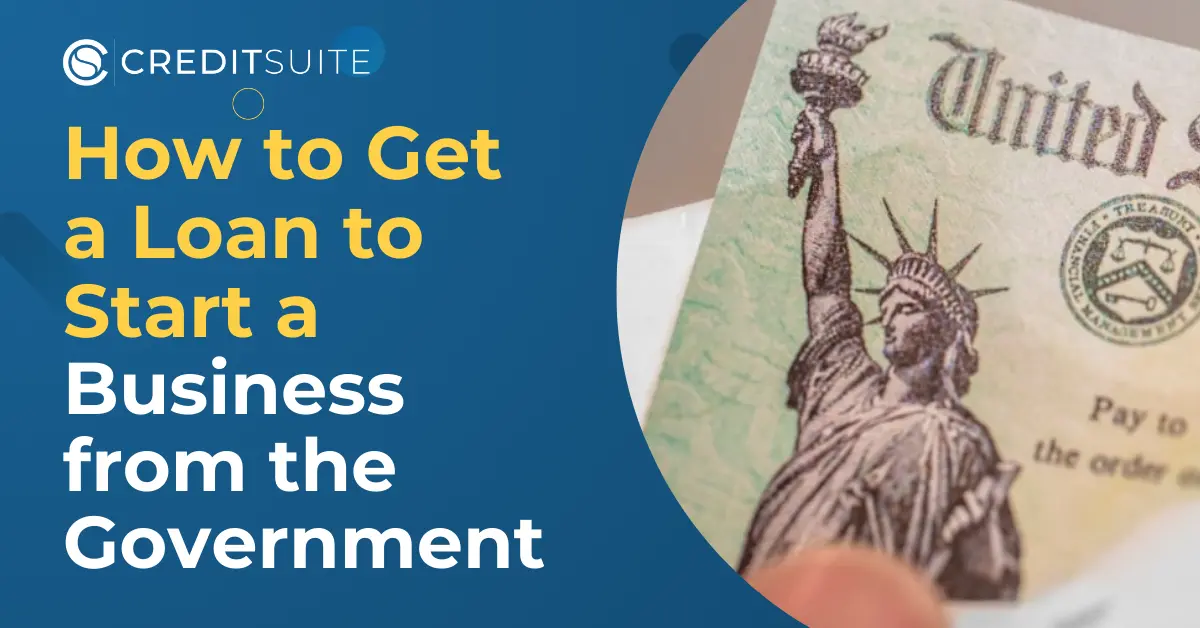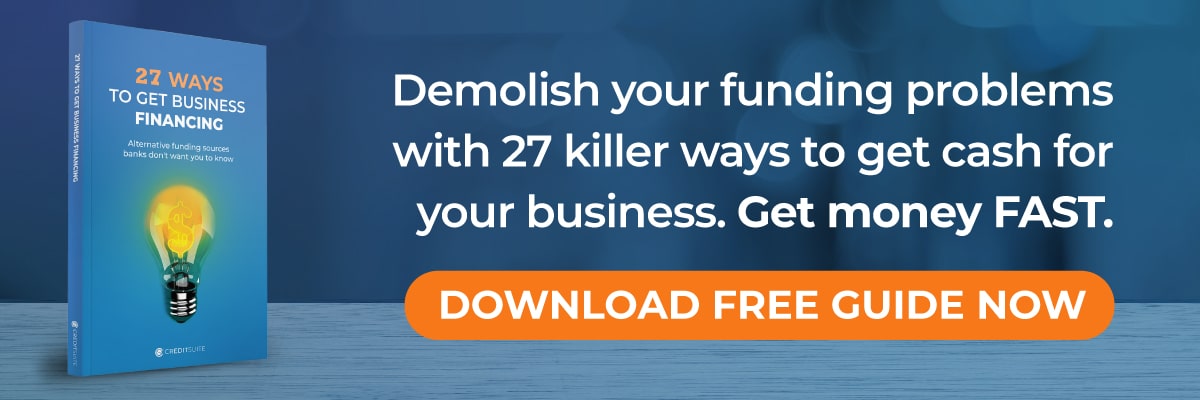Are you interested in how to get a loan to start a business from the government? Yes, you can get money from the government, and there is more than one loan program available for business owners.
Because it’s in the best interests of American governments at any level to support small business growth and development, there are several choices out there.
There are also alternative funding options for when it’s not enough, it’s taking too long, or there are too many restrictions put on the use of the funds.
Let’s get started.
Step 1 – Build Your Fundability™
Surprised? Looking for money without a plan is a pretty sure way to not get any money. But when you deliberately build small business Fundability™, you are setting yourself up for success.
And along the way, the steps you take to build small business Fundability™ will help to keep you out of legal hot water and will assure customers and prospects that your business is legitimate.
The new Credit Suite Fundability™ product can help you gauge just how far you’ve come, and the kinds of funding you can get now. We also show you how a few small things can move the needle a lot.
Step 2 – Work With an Advisor
Credit Suite is always happy to assist, of course. But there is also your local Small Business Development Center. Turn to an SBDC if you are interested in government small business loans from the SBA.
Business owners can get individualized advising and technical assistance, including how to write a business plan and how to fill out a small business loan application. And they can also help you decide which lender is most likely to approve your loan.
For more help, including what’s missing from your business’s overall picture of Fundability™, contact us today and we will be happy to help.
Step 3 – Decide on Your Best Possible Lender
What is the best lender for a startup business loan? You will need to take a few things into consideration and weigh your loan options carefully.
Factors to consider include:
- Can you actually get a loan from this provider? If they demand three years in business that you don’t have yet, don’t even bother. You’re not going to change their mind
- How much can you get? After reviewing your needs, you may find that your initial estimate was off (in either direction). A business needing $1 million is not going to be well served by a loan for $10,000, although if that kind of capital can be obtained with little effort, they may as well. That scenario would be a cost-benefit analysis for the company
- How long until you get the money? If you can afford to wait, then SBA lending might be a good idea. But if you can’t, then an MCA might be more your speed
- How much time do you have to repay the loan? Fast funding will often need to be repaid just as quickly. A seasonal business may not be able to do that
- What sort of interest will you pay, and what are the rates and fees? Good rates do you little good if the fees are sky high
Step 4 – Fill in Any Remaining Fundability™ Gaps
Do you have a business bank account? Are you bringing in regular customers, resulting in good cash flow?
The best loan program for you will outline much if not all of what they are looking for. So, shore up your business where it’s weakest. This can only help you.
Step 5 – Gather All Necessary Paperwork
This will depend on the individual lending institution’s requirements. But many business lending providers want to see yours and your company’s tax returns and company financial statements. A lot will want to peruse your business plan as well.
If any of these documents are not in order, or they don’t exist yet, now is the time to rectify that.
Step 6 – Prepare Your Application and Send it In
Perhaps this step seems obvious, but it still has to be accomplished. Some online applications (like for Funding Circle) are short and you can prepare them easily in one sitting. An application for a standard bank loan will ask for more information and can take you longer to fill out.
If you are very busy and the business is just you, you may not have the time for an in-person meeting or even a talk on the phone.
Types of Government Business Loans
Type 1 – SBA 7a Loan Program
 The Small Business Administration is in the business of facilitating loans for small businesses. Keep in mind that there is often a lot of paperwork involved with getting a loan from the SBA.
The Small Business Administration is in the business of facilitating loans for small businesses. Keep in mind that there is often a lot of paperwork involved with getting a loan from the SBA.
A 7a is the SBA’s most popular loan program. It is a great choice for a small business wanting a working capital loan. Get up to $5 million in small business financing for several purposes, including purchasing supplies and refinancing debt.
But recognize that this government loan is small business financing that comes with some strings attached. Also, you will have to wait for this small business loan. Hence these are not the best small business loans for a small business in a hurry.
Type 2 – Lending Through a Community Development Financial Institution
This is another SBA program, with Community Advantage. A CDFI works with business owners in underserved communities to assist with a community’s economic development. This program offers a more streamlined method for getting a 7(a) business loan.
The maximum loan amount is $250,000. The Small Business Administration will guarantee up to 85% of any start up loan of $150,000 or less, and up to 75% for any SBA loan for more than $150,000.
The idea behind this economic opportunity program is to get government business loans into the hands of the small business owners who truly need them the most. You can even get an SBA Express loan through them.
Type 3 – A Business Grant from the Government
While not technically a business loan, the government will give a grant to a small business. Keep in mind that applying for grants is rather time consuming.
Grants also tend to not be for a lot of money. So, if you want grants, you will still need to consider another small business financing option.
The advantage is this is working capital financing which you do not normally have to pay back. However, the bad news is that the time spent on an application may very well not be balanced out by how much money you get.
Best for a small business where the entrepreneur is good at writing and has other finance options to round out the money they may or may not get.
Why Is It Difficult For Small Businesses To Get Loans From The Government?
With the exception of 2020, when it seemed as if just about anyone could get a PPP loan, the government tends to be somewhat conservative when it comes to lending.
While the United States government (at any level) is committed to helping out small businesses, they also, understandably, want to be sure that any borrower will pay them back.But it’s not the paradox you think. It is, though, dual interests that are sometimes in conflict.
As a result, SBA loans are backed by the government, which makes it easier for banks to say yes, while at the same time demanding a ton of paperwork. And while an individual lender may work quickly, the SBA does not.
The government doesn’t love providing funding to a new business because it’s harder for them to gauge how likely they are to receive the full amount owed back to them.
Will you default? Will they have to turn over the collection to the Treasury Department? The SBA is serious about getting its full value from the government loans it provides.
Defaulting on a government small business loan means the Treasury Dept. could come after your personal assets (like if you default on a personal loan). They have no qualms about garnishing your wages or taking your retirement funds. Yikes!
Alternate Financing Options
Option 1 – A Business Credit Card
If you’ve been reading for a while, you’ll know that we mention business credit a lot. But that’s for a very good reason.
Building business credit with your EIN means even a small business owner with bad credit can still get cash. And even business owners with good personal credit can still benefit from it, because corporate credit helps to shield your personal assets.
Everything from small business banking to incorporating affects your corporate credit and, when you build Fundability™ smartly, opens up financing choice after financing choice.
Credit for your small business will help you get a company loan in the future. So, if you are having trouble getting all the working capital you need, improving your corporate credit score can only help you.
Option 2 – A Merchant Cash Advance
For a startup small business which already has regular credit card sales, an MCA can be the answer for money for your business, particularly if you have a low credit score.
Approval for an MCA is mainly situated around your customers’ reputation for prompt payment. As such, the personal credit score for business owners does not loom very large.
But recognize that this is an expensive form of business funding. Interest rates are high, so check a small business loan calculator before you sign anything.
And, unlike the kind of business term loan you may be more familiar with, the payback period is short. How short? Less than half a year.
Option 3 – Angel Investors
Unlike a venture capital firm, which will really only be interested in cutting edge businesses, an angel investor wants to invest in perhaps a more conventional business.
Yes, your mom can be an angel investor!
But recognize that you are selling a portion of your business. That means you are splitting profits and may need to answer to shareholders when you make major decisions. But if your business is in a bind and you can’t get a loan, consider pieces of it as assets you can sell.
Option 4 – Crowdfunding
 If you have a good online following and do well in front of a camera, don’t knock crowdfunding. If both of these things are true about you—and if your business has a compelling story, message, or product/service—your chances of success are better.
If you have a good online following and do well in front of a camera, don’t knock crowdfunding. If both of these things are true about you—and if your business has a compelling story, message, or product/service—your chances of success are better.
But if you only have one of these, the odds are longer. If you consider crowdfunding seriously, make sure you have a backup plan.
Option 5 – A Startup Loan from Traditional Lenders
We would be remiss if we did not mention this kind of option for business financing, from a bank or credit union. But recognize that it is harder to get than many of the other options we’ve outlined today.
In essence, you will need to prove to a lender that you will pay your small business loan back. How? Even a startup with a few years under its belt still doesn’t have a very long time in business.
Therefore, a lender will rely on other means. They will look at your consumer credit report to see what your history is in terms of paying a lender back. And they will likely want some form of collateral.
They may also charge higher interest rates and only give a loan for a shorter loan term for these term loans.
Takeaways
New businesses have options when it comes to getting money. The more fundable your business is, the more and better choices you are going to have.
Why not contact us today to explore your options and fix your Fundability™ issues?
Let’s improve your business and your chances together. We want you to succeed!

